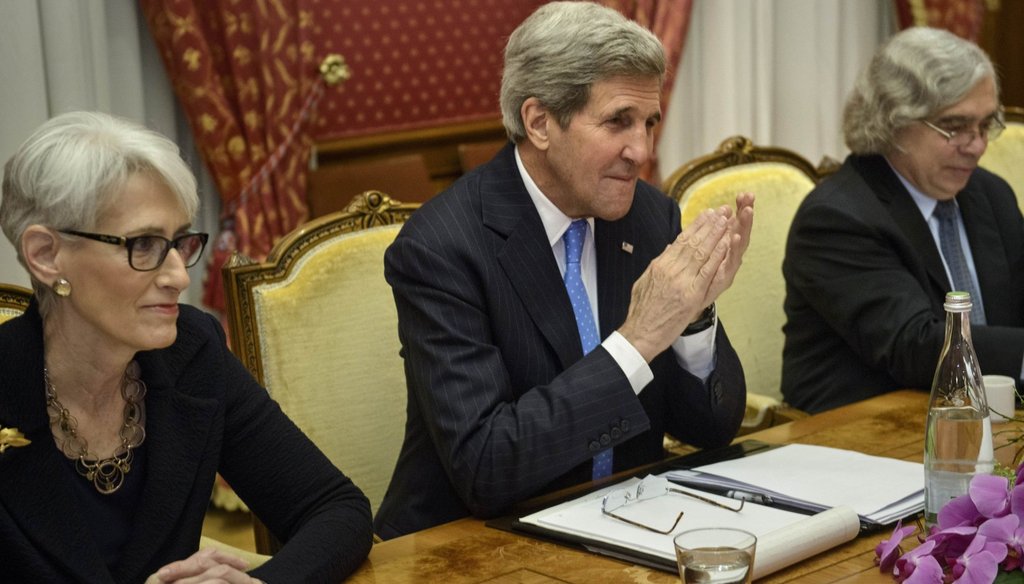Get PolitiFact in your inbox.

Under Secretary for Political Affairs Wendy Sherman, U.S. Secretary of State John Kerry and U.S. Secretary of Energy Ernest Moniz wait for a meeting with the Iranians in Switzerland on March 29, 2015.
Negotiations over a deal about Iran’s nuclear program ratcheted up as the parties try to meet a deadline of March 31 for an agreement outline.
Here at PolitiFact, we’ve been fact-checking claims about the negotiations, Iran’s nuclear program and other national security issues.
The negotiations are between Iran and the five permanent members of the United Nations Security Council, plus Germany, known as the P5+1. In November 2013, the parties signed an agreement that temporarily stopped Iran’s production of potentially weapons-grade nuclear material.
In 2014, that agreement was extended, giving Iran more sanctions relief, such as the ability to sell oil and to gain access to assets frozen in overseas bank accounts.
In return, Iran agreed to continue enriching uranium only to the diluted level of 5 percent and with its stockpile capped. That falls well short of what weapon makers would need to create a bomb. This interim agreement expires in June.
Sign up for PolitiFact texts
Critics of the deal say the first 5 percent enrichment is the toughest, meaning it would be comparatively easy for Iran to higher levels. Still, supporters of the administration’s approach counter that it would take Iran roughly a year to make a bomb, leaving time for the world to detect what’s happening and respond.
Meanwhile, the agreement has stoked all sorts of rhetoric in response. Most notable here in the United States has been a letter from 47 Republican senators, who wrote directly to Iran to question the deal. This unusual interference from Congress stoked outrage among President Barack Obama’s supporters, who launched the Twitter hashtag of #47Traitors.
The letter and its fallout
The letter, put together by U.S. Sen. Tom Cotton, R-Ark., says that if Obama strikes a nuclear deal with Iran, "the next president could revoke such an executive agreement with the stroke of a pen and future Congresses could modify the terms of the agreement at any time." This is partially accurate but leaves out context. We found broad agreement among experts that a future president or a future Congress could indeed undo or modify an agreement, but the senators’ letter makes the process sound more clear cut and easier than it actually is. We rated the claim Half True.
Another senator who signed the letter, Ron Johnson, R-Wis., said he only wanted for the U.S. Congress what the parliament in Iran was getting. "The Iranian parliament will get to say yes or no on this deal, and I think the United States Congress should have the exact same input into the process," he said on Fox News Sunday on March 8.
This is incorrect on two accounts. Experts said the nuclear agreement between the United States and Iran won’t require ratification by Iran’s parliament, the Islamic Consultative Assembly. It’s possible the parliament will discuss the deal, and the deal itself might be contingent on a previous international nuclear agreement that requires ratification. But that’s not the deal currently being worked on. And even if the parliament did approve the current deal, it would be entirely symbolic, as the body is heavily influenced by the supreme leader on foreign policy matters. We rated the statement Mostly False.
The Senate letter inspired Vice President Joe Biden, himself a former senator from Delaware, to issue a statement decrying the letter as "beneath the dignity of an institution I revere."
"Around the world, America’s influence depends on its ability to honor its commitments," Biden wrote. "Some of these are made in international agreements approved by Congress. However, as the authors of this letter must know, the vast majority of our international commitments take effect without congressional approval."
Actually, Biden is exaggerating when he says the "vast majority" of international agreements take place without Congress weighing in. Congress has different means of weighing on agreements, even executive agreements. Sometimes Congress must enact statutes for the agreement to go forward, and sometimes they approve earlier treaties that form the basis of later agreements. Experts have analyzed many different types of agreements, and found that Congress weighs in on a fairly regular basis. We rated Biden’s statement Half True.
Two pundits weighed in on the letter to say that Democrats have run similar interference against Republican presidents in years past. But the details on both claims were off. Pundit Sean Hannity said that in 2007, when Nancy Pelosi met with President Assad of Syria and "nobody got upset." That’s rewriting history, as many politicians, pundits and editorial boards spoke out against Pelosi’s trip. So we rated Hannity’s statement False. Talk radio host Rush LImbaugh said that the late U.S. Ted Kennedy, D-Mass., "sent a letter to then Soviet leader Yuri Andropov apologizing for Ronald Reagan and begging the Soviets not to overreact." There is a long and unverified anecdote of a much lighter overture made to the Russians on Kennedy’s behalf, but we found zero evidence of letter penned by Kennedy himself. So we rated the claim False.
Senate majority leader Mitch McConnell, R-Ky., got a more accurate rating for his description of Secretary of State John Kerry. "John Kerry, when he was a senator, flew to Managua and met with a communist dictator there, Daniel Ortega, and accused the Reagan administration of engaging in terrorism," McConnell said. We found that McConnell's comments didn't capture the timeline quite right, but were still largely accurate. We rated his statement Mostly True.
Arguing over a deal
While the negotiations have been controversial, Obama has repeatedly defended the negotiations as productive.
"Over the last year and a half, since we began negotiations with them, that's probably the first year and a half in which Iran has not advanced its nuclear program in the last decade," Obama said on CNN in December 2014.
That’s largely accurate, according to experts. International observers report that Iran complied with the terms of the temporary agreement. The amount of enriched uranium is less, and the country’s facilities to produce weapons-grade material have been curtailed.
But that does not mean the country has completely stopped all activities that could produce nuclear weapons material in the future, experts said. There’s also concern about broader aspects of a nuclear weapons program, such as weapons design and missile development. We rated Obama’s claim Mostly True.
About a week later, Stephen Hayes of the conservative Weekly Standard magazine, said nearly the opposite -- that "We've caught Iran cheating on the interim (nuclear) deal."
Actually, we haven’t caught Iran cheating on the interim deal. The International Atomic Energy Agency has reported no violations with the Joint Plan of Action. That said, Iran has worked with a new kind of centrifuge that, while not a formal violation, contradicts the U.S. understanding of the deal. When confronted about it, Iran stopped its work. Also, there is some question about whether Iran is violating the agreement by exporting too much oil. That’s another murky issue; the exact terms that govern Iran's oil exports aren’t public. Overall, we rated Hayes’ claim Mostly False.
More recently, conservative pundit Liz Cheney questioned Iran’s abilities to hold to an agreement. "The IAEA last month said the Iranians are not currently living up to their obligations," she said.
That rates Mostly True.
The difference between the claims made by Hayes and Cheney? Hayes was talking about the interim agreement specifically. Cheney was not.
The International Atomic Energy Agency published a report in February that said Iran wasn’t giving the agency the level of access and information required to verify that all nuclear activity in Iran is peaceful -- a violation of their obligations as signatories of the Nonproliferation of Nuclear Weapons Treaty.
Circling back to the interim agreement, there exists an odd paradox: Negotiators want to limit the number of centrifuges Iran can have -- but under these limitations, the country would have enough centrifuges needed for a weapon but too few for a nuclear power program.
Former CIA deputy director Michael Morell made the point on Charlie Rose in February. "If you are going to have a nuclear weapons program, 5,000 is pretty much the number you need," Morell said. "If you have a power program, you need a lot more. By limiting them to a small number of centrifuges, we are limiting them to the number you need for a weapon."
Experts agreed that Morell has his facts right. A power plant requires tons of fuel each year. A bomb requires about 25 kilograms of U-235 enriched to the 90 percent level. If an agreement limits Iran to about 5,000 centrifuges, that would be sufficient to produce enough bomb-grade material but would leave Iran well short of the capacity to generate fuel to power nuclear power plants. We rated the claim True.
Our Sources
See fact-checks for sources.



















































